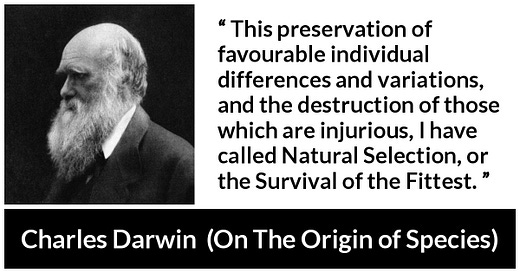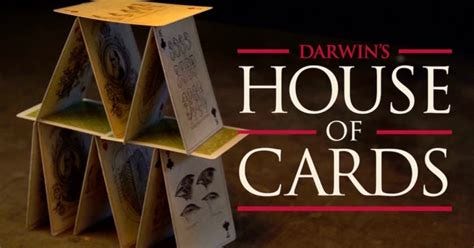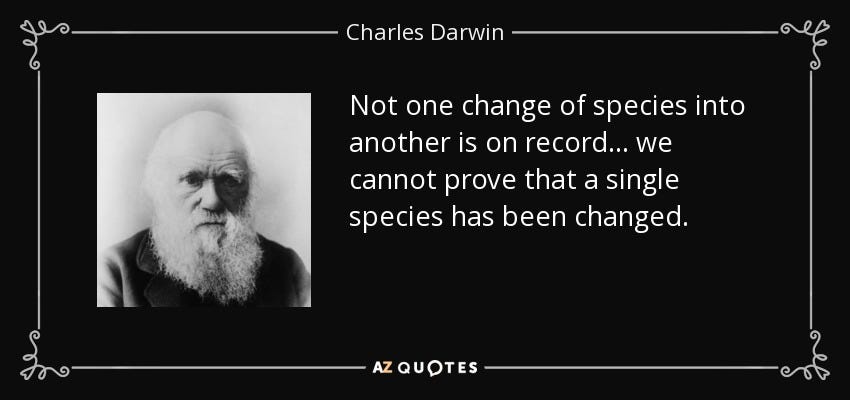Evolution and the Natural Selection nonsense.
$cientism in all its glorious word-salad gibberish. Nature is not your mother, and is not a selecting agent or filter.
“To suppose that the eye….could have been formed by natural selection seems, I freely confess, absurd in the highest degree.” Charles Darwin in Origins (who then goes on to try to explain the absurdity and fails).
Natural Selection and rhetoric
In Tom Bethell’s book, ‘Darwin’s House of Cards’, he summarises the current definition of what natural selection means in Darwinian terms:
‘What do we really know about natural selection? To summarize the current view: As a source of innovation, mutations in the DNA molecule generate random variations, and natural selection then acts as a filtering device. “Unfit” variants rarely survive even the early stages of development. As a matter of observation, then, what we find when organisms reproduce is that descendants incorporate small changes. Offspring differ a little from their parents, and their offspring differ even more from their grandparents. And so on. So the reproduction that we see is imperfect. All die in the end, but some variant forms contrive to leave more offspring than others.’
So what do the ‘small changes’ in offspring mean scientifically? Do they lead to metamorphosis, new structures, new software programming (genes, DNA, RNA)? The answer is they do not.
What is it?
Since the time of Darwin and his invocation of ‘natural selection’, ‘the science’ believes that unseen forces and selective agents will add changes to the genomic structure of animals and species. This will give animals a ‘competitive advantage’ over their peers and ‘rivals’. Over long periods of time, these changes will form new animals and species, ‘adapted’ to their environment. You are fit therefore you survive.
This theory is of course utter nonsense.
One could rightly ask for example, where are these new species? It is obvious that there are means or averages. Humans are bound by their software, genomic structure and by reproduction. You don’t mate with a tulip or a tiger. Cats mate with cats. Dogs mate with dogs or other canines including foxes. Bears with those of the same kind. A cat cannot mate with a pigeon and will not add pigeon software to its own software.
So where are the new species?
No new species have ever been witnessed. We know that there is no ‘striving’ by any animal within a defined species to acquire new ‘traits’. We also know that anything outside the mean genomic structure cannot be added to the individual nor to the general group. The software and operating systems are fixed within a range.
Bethell (bold is mine): ‘But such a transformation has never been observed. No species has ever been seen to evolve into another. What scientists do observe is something quite different: reversion to a mean. Such reversion can be analogized to commuting, or going back and forth. To alter the metaphor, reversion to the mean implies that species inhabit “plateaus” of limited space upon which variants are free to roam. Artificial selection can “push” varieties to the edge of the plateau, but they cannot be pushed off it or be made to invade the terrain of adjacent species. No experiment has shown us otherwise.’
Artificial selection, such as Darwin playing with his orchids, has nothing to do with ‘natural selection’. Nature does not select anything. She is not our mother. Nature is cold, cruel, impersonal and indifferent. Nature does not 2have a mind. Nature does not care if you live, die, ‘evolve’, ‘devolve’, or disappear into a Buddhist inspired salt crystal. There is no filtering. Through logical extension we know that natural selection simply does not exist.
Bethell: ‘But can “nature” make choices in the same way that a farmer can when he is deciding which variants to select? That it could was one of the main arguments in The Origin. In response to Darwin, the philosopher Jerry Fodor, the author of What Darwin Got Wrong (with Massimo Piattelli-Palmarini, 2010) said that natural selection can’t make decisions. Fodor also wrote that natural selection “can’t run experiments,” and it “can’t consult the intentions of the builder.” Doing any of those requires having a mind, and, by general consensus, natural selection doesn’t have one. Fodor’s point was that whole organisms leave offspring, and they include numerous traits that are inevitably conflated. So when they leave offspring, it is impossible to say which of the conflated traits has been selected for. Fodor’s criticism has never been rebutted.’
No one can refute either Bethell or Fodor’s logical objection to the idea that random chance events, are somehow filtered by ‘Nature’ and find their expression in genetic improvements or ‘competitive advantage’. The entire complex of what makes an organism functional and species specific defies easy rhetorical devices to take small, isolated, adaptive changes and turn the animal into a different species. This has never been witnessed in a lab, nor in nature.
Means and oscillations
The failure of Darwinism and Evolution is quite apparent. DNA, RNA, proteins, amino acids, a trillion atoms per cell, 70 trillion cells per human (we don’t know the actual total), cannot ‘self form’, from naturalistic processes and ‘selection’. No proof of this exists. Neither does any proof exist of common descent, metamorphological changes, or new species through naturalistic adaptations.
A polar bear is still a bear. A brown bear is still a bear. A finch with a large beak is still a bird. A finch with a small beak is still a bird. Nothing has ‘evolved’. All of these animals, as Bethell points out, revert to a mean. They may oscillate within the confines of their software, they may improve or degrade, but they always revert back to the mean.
Humans oscillate between 3.5 feet in height and pace Goliath or King Bashar of Og, 10-11 feet in height. The ‘giants’ are now extinct. Bushmen and the very short are somewhat rare. So we can say that the vast majority of humans stand somewhere between 5 feet and 6.5 feet in height. Our height oscillates around this mean. Exceptions only prove this rule.
Bethell quotes the atheo-agnostic Karl Popper who nicely summarises the non-science of Darwinism, ‘In his autobiography, Karl Popper said he had come to the conclusion that “Darwinism is not a testable scientific theory, but a metaphysical research program.”’ And so it is.
If a theory cannot be falsified, if every event or happenstance supports the theory, if every outcome confirms its thesis, if every occurrence reinforces the hypothesis, then it is not a science, but a philosophical and metaphysical program.
Darwinism has never been about science. It was always a philosophical and quasi-religious program.
==
Some sources you shouldn’t read:
Bethell, Tom, ‘Darwin’s House of Cards’, 2017.
Ferrell, Vance, ‘Evolution handbook’
Bergman, J. ‘The Three Pillars of Evolution Demolished’
Denton, M., ‘The miracle of Man’
Denton, M. ‘The miracle of the cell’
Behe, M. ‘Darwin Devolves’.
Milton, R. ‘Shattering the myths of Darwinism’











Great critique of Darwinism. What do you consider the most compelling explanation for the origins of life?